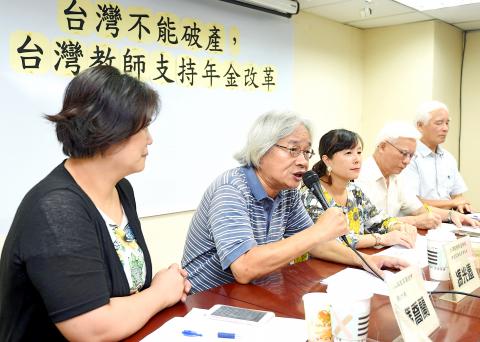A number of civic groups yesterday said that President Tsai Ing-wen (蔡英文) should be wary of an impending financial crisis facing the nation if the pension system does not undergo a systematic reform.
Public servants who are set to launch a parade tomorrow in protest of pension reform claim that they are against “arbitrary” changes to pension rules, Northern Taiwan Society deputy chairman Lee Chuan-hsin (李川信) told a news conference.
However, what they really mean is “do not pinch one penny from me,” Lee said, adding that this attitude is similar to those adopted by public servants during failed pension reform in 2002.

Photo: Chu Pei-hsiung, Taipei Times
Lee, a teacher who has been retired for 10 years, said he often does not tell people that he was a teacher out of concern they might resent him because of the generous pension he receives — NT$85,000 (US$2,656) per month before the 18 percent preferential interest rate for public servants was canceled.
Northern Taiwan Society chairman Chang Yeh-sen (張葉森) said that Tsai’s campaign promise of pension reform to salvage the nation from bankruptcy was a major factor behind her emphatic election win.
“Tsai must fulfill that pledge, otherwise she will not stand a chance of re-election and, in the worst-case scenario, could be deposed,” Chang said.
Union of Taiwanese Teachers director-general Hsiao Hsiao-ling (蕭曉玲) said that many teachers are in favor of pension reform, even though they represent part of the vested interest.
“They said that they would rather be given smaller pensions. Otherwise, when the nation goes bankrupt, there will be no future for their children,” Hsiao said.
She panned the exorbitant income replacement ratio enjoyed by teachers at public schools.
Hsiao said that she would need to pay about NT$1.5 million into the mandatory pension fund throughout her career.
She said that under the current system, she would not only be able to reclaim the NT$1.5 million, but also receive between NT$60,000 and NT$70,000 every month in her retirement, meaning that she would be able to offset what she had paid in just over two years.
“Is there any nation in the world that offers public servants such great welfare?” she asked.
Hsiao said that she supports breaking down the barriers between different professions and setting a single ceiling for pensions, thereby achieving a balance in the pension received by laborers and public servants.
Union member and pension reform committee member Neil Peng (馮光遠) lambasted what he said was a complacency displayed by public servants who oppose pension reform.
“Some people think that because they used to be a general or a manager, they ought to live like a general or a manager in their retirement,” he said.
However, what these people have forgotten is that in the nation’s formative years, a job in the public sector was considered less desirable, which prompted the government to inject huge amounts of capital to provide incentives for people to take up public posts, which has made them the “elite” they are, Peng said.
“The government cared so much about you when you were the minority. However, have you ever cared about the ‘new’ minority?” Peng said, criticizing those who oppose reform as “greedy” and “selfish.”

Alain Robert, known as the "French Spider-Man," praised Alex Honnold as exceptionally well-prepared after the US climber completed a free solo ascent of Taipei 101 yesterday. Robert said Honnold's ascent of the 508m-tall skyscraper in just more than one-and-a-half hours without using safety ropes or equipment was a remarkable achievement. "This is my life," he said in an interview conducted in French, adding that he liked the feeling of being "on the edge of danger." The 63-year-old Frenchman climbed Taipei 101 using ropes in December 2004, taking about four hours to reach the top. On a one-to-10 scale of difficulty, Robert said Taipei 101

Nipah virus infection is to be officially listed as a category 5 notifiable infectious disease in Taiwan in March, while clinical treatment guidelines are being formulated, the Centers for Disease Control (CDC) said yesterday. With Nipah infections being reported in other countries and considering its relatively high fatality rate, the centers on Jan. 16 announced that it would be listed as a notifiable infectious disease to bolster the nation’s systematic early warning system and increase public awareness, the CDC said. Bangladesh reported four fatal cases last year in separate districts, with three linked to raw date palm sap consumption, CDC Epidemic Intelligence

Taiwanese and US defense groups are collaborating to introduce deployable, semi-autonomous manufacturing systems for drones and components in a boost to the nation’s supply chain resilience. Taiwan’s G-Tech Optroelectronics Corp subsidiary GTOC and the US’ Aerkomm Inc on Friday announced an agreement with fellow US-based Firestorm Lab to adopt the latter’s xCell, a technology featuring 3D printers fitted in 6.1m container units. The systems enable aerial platforms and parts to be produced in high volumes from dispersed nodes capable of rapid redeployment, to minimize the risk of enemy strikes and to meet field requirements, they said. Firestorm chief technology officer Ian Muceus said

MORE FALL: An investigation into one of Xi’s key cronies, part of a broader ‘anti-corruption’ drive, indicates that he might have a deep distrust in the military, an expert said China’s latest military purge underscores systemic risks in its shift from collective leadership to sole rule under Chinese President Xi Jinping (習近平), and could disrupt its chain of command and military capabilities, a national security official said yesterday. If decisionmaking within the Chinese Communist Party has become “irrational” under one-man rule, the Taiwan Strait and the regional situation must be approached with extreme caution, given unforeseen risks, they added. The anonymous official made the remarks as China’s Central Military Commission Vice Chairman Zhang Youxia (張又俠) and Joint Staff Department Chief of Staff Liu Zhenli (劉振立) were reportedly being investigated for suspected “serious